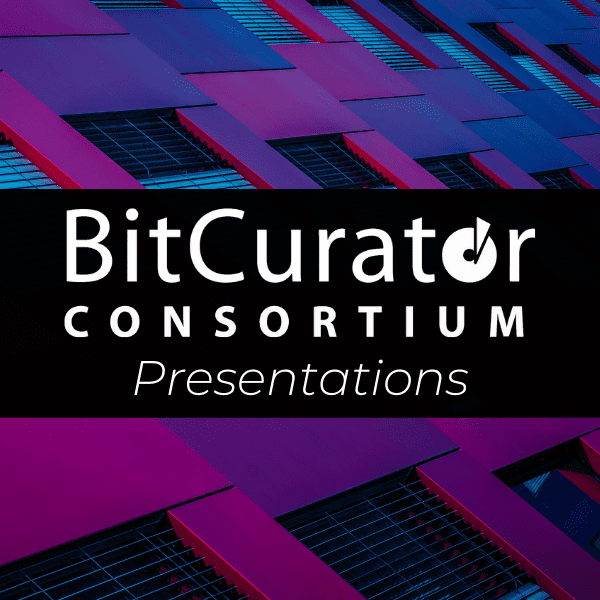Session 3: BitCurator
Jamie Patrick-Burns, State Archives of North Carolina; John Richan and Sarah Lake, Concordia University; Grace Muñoz, UCLA | BitCurator Consortium
Leveling Up on Preservation: Using BitCurator Reports to Better Preserve State Archives Materials
Jamie Patrick-Burns, State Archives of North Carolina
In 2020 the State Archives of NC (SANC) adopted a “levels of preservation” document to standardize preservation actions for electronic records. These actions include generating file format, PII, and duplicate identification reports for all collections upon ingest in the digital repository. This presentation will share the levels of preservation and discuss testing in BitCurator to identify tools for running these reports.
Existing “good enough” practice has been to run virus scans and checksums on all ingests and generate detailed reports later when processing. Moving forward, desired (best) practice will be running file format, PII, and duplicate reports for every collection. We experimented with BitCurator tools, including running bulk_extractor with regular expressions from the TOMES NLP dictionary which identifies PII and entities of interest for state government. While successful in testing, we will need to address scalability issues given large holdings, computing limitations, and time constraints.
Having established reporting procedures is particularly important for SANC given public records law’s mandate to preserve and provide access to state government records, while protecting confidential information defined by state statute. Reports are vital for triage and redaction so that public records requests can be fulfilled promptly and sensitive information is protected. The reports will also help identify records requiring urgent action based on format or sensitive content, while maintaining transparent, trustworthy procedures.
BitCurator from Scratch: Internship to Production Environment Implementation at Concordia University
John Richan and Sarah Lake, Concordia University
A lack of time and funding are common hurdles for archives staff seeking to explore and implement new tools. This presentation will consider how internships can serve as valuable opportunities for recent graduates to collaborate with archivists in order to test out new tools and digital archiving workflows.
During the Summer of 2019, Concordia University Records Management and Archives (RMA) decided to start using BitCurator within the framework of an internship project. The primary goal of the project was to support the RMA Digital Archivist in setting up the BitCurator environment toward preserving at-risk digital material. Unlike many archival internships that focus on a specific processing project, this project was designed to give the intern a bird’s eye view of all RMA’s workflows and tools in order to identify gaps and integrate new tools into existing practices. The presentation will highlight the outcomes of the project and discuss the challenges and rewards of exploring this new approach.
Teaching with BitCurator: A Case Study in the Development of an Online Instructional Module
Grace Muñoz, UCLA
The COVID-19 pandemic has led to an increased need for online instructional modules to help facilitate independent learning. With limited opportunities for MLIS students to gain hands on experience, online instructional modules serve as options by which students can gain valuable technical experience that will help them stand out in a competitive job market. But creating instructional modules to suit the needs of online learning can come with its own set of challenges.
This presentation will examine the pedagogical design behind an instructional module developed during the UCLA MLIS course, Digital Preservation. The module aims to introduce MLIS students and information professionals to digital forensics and how BitCurator can be used to identify personally identifiable information. With no previous experience in how to use BitCurator, the creators of this project faced a steep learning curve but managed to produce a module that turned these learning challenges into learning opportunities. The feedback received from fellow MLIS students on the efficacy of this module highlighted the interest and need for similar instructional modules covering technical topics.
Slides Transcript
Jamie Patrick-Burns, State Archives of North Carolina; John Richan and Sarah Lake, Concordia University; Grace Muñoz, UCLA. (November 17, 2021). Session 3: BitCurator. BitCurator Consortium.